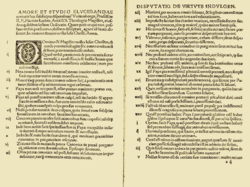| Part of a series on the |
| Reformation |
|---|
 |
| Protestantism |
The Magisterial Reformation refers in particular to the history of the Lutheran, Reformed, and Anglican traditions within Protestant Christianity, [1][2] in how these denominations "related to secular authorities, such as princes, magistrates, or city councils", i.e. "the magistracy".[3][4] While the Radical Reformation (that led to the Anabaptist Churches) rejected any secular authority over the church,[5] the Magisterial Reformation argued for the interdependence of the church and secular authorities. As Alister McGrath put it "The magistrate had a right to authority within the church, just as the church could rely on the authority of the magistrate to enforce discipline, suppress heresy, or maintain order."[4]
The major theological figures representing the Magisterial Reformation were Luther, Zwingli, Calvin[6] and Knox,[7] as well as Thomas Cranmer. The Magisterial Reformers believed that secular authority should be followed where it did not clash with biblical commands. An early example of this was seen in the Peasant’s Rebellion of 1525, towards which Luther had been sympathetic, but which later he condemned.[8][9]
The term magisterial relates also to the emphasis these denominations place on the authority of the teachers of the early church (such as St Augustine of Hippo).
The churches in the Magisterial Reformation deny to the Church of Rome exclusive claims to Catholic, thus of being the only one true church, insisting rather that they too remain part of the Catholic Church as set out in the Nicene Creed.
- ^ Shah, Timothy Samuel; Hertzke, Allen D. (26 April 2016). Christianity and Freedom: Volume 1, Historical Perspectives. Cambridge University Press. ISBN 978-1-316-55285-8.
... where nationally dominant magisterial Protestant churches (Lutheran, Anglican, and Presbyterian) became virtual "departments of state" in their governance, as one Reformation historian characterized them.
- ^ Cremeens, Timothy B. (28 June 2018). Marginalized Voices: A History of the Charismatic Movement in the Orthodox Church in North America 1972-1993. Wipf and Stock Publishers. p. 157. ISBN 978-1-5326-1708-9.
The "magisterial" Protestant denominations (i.e., Lutheran, Reformed, and Anglican) all claimed to honor the ecumenical Councils of the undivided Church and give a modicum of authority to the Church Fathers
- ^ Voorst, Robert E. Van (1 January 2014). Readings in Christianity. Cengage Learning. p. 164. ISBN 978-1-305-14304-3.
The Magisterial Reformation denotes the Lutheran, Calvinist, and Anglican churches; this is sometimes labeled the mainstream of the Reformation. Magisterial means that secular authorities ("magistrates") had a role in the life of the church; church and state were closely tied.
- ^ a b McGrath, Alister (1998), Historical Theology, Oxford: Blackwell Publishers, p. 159, ISBN 0-63120843-7
- ^ Saint-Clair, Geoffrey (2001), "Who's Who in the Reformation", The Radical Reformation, Catholic education, retrieved 2012-11-17
- ^ "The radical Reformation reassessed". The Gospel Coalition.
- ^ "Thomas Muntzer & John Knox: radical & magisterial reformers". Cambridge Universitiy Press.
- ^ "Luther's reactions to peasant rebellions" (PDF). Bloomsbury.
- ^ "Martin Luther and the peasants' rebellion". Socialist Worker.
© MMXXIII Rich X Search. We shall prevail. All rights reserved. Rich X Search
